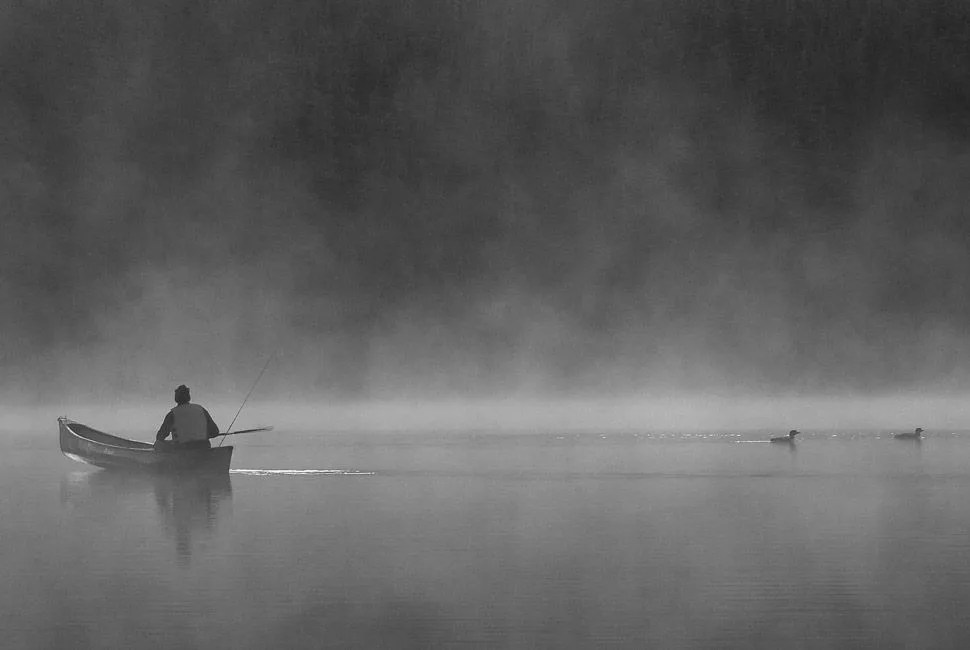I have to warn you, as a travel story, this thing probably falls short. There’s no service angle, no timely peg. No advice, tips, checklists, “if you go”, etc. I’m not selling anything, except maybe a lifestyle upgrade. There’s not even a destination. Not really. Vermont is about all I’ll give up. A lake in northern Vermont. A remote, spring-fed lake that happens to be home to a titan race of smallmouth bass that have gone un-harassed by fishermen since the Pleistocene. A natural showpiece unspoiled by man, hidden by red spruce and hemlock and towering aspen, and hands down the best smallmouth fishery that I know of in the east. Besides a few other particulars, I’m not revealing jack. We all have our secret spots, and this one’s mine.
13 summers ago, in my late 20s, I learned to fly fish here, and it was like finding a new religion. I watched smallmouth ascend from murky depths to inhale No. 8 bass poppers, tear off 30 yards of line while tugging an 85-pound canoe through weed beds and rocket from the water like marlins, showing white bellies gone fat on perch. The idea of warfare with the natural world had never occurred to me. But here we were, two species locked in a primal symbiotic battle, woven together in an explosion of flesh and bone and state-of-the-art manufacturing. Those early days bled into years, a medley of surly bass and Old Milwaukee and getting devoured by black flies. All of the biggest freshwater fish of my life have come here on a nine-foot, five-weight rod: four-and-five-pound smallmouth hauled from their shoreline beds in June, netted and released back into the lake. What’s crazy is nobody else fishes here — not for bass. You’ll see an occasional trotline rigged for lake trout. Otherwise, it’s all loons and owls, minks and moose. Living in New York, the lake has been my portal to psychic renewal, my Stargate wormhole to a saner, quieter dimension.
It didn’t come easy. As a boy in Michigan I bait fished for perch and salmon off the pier in South Haven, catching squat. The whole enterprise baffled me. A permanent headache is all it seemed, and for what? Eventually I gave up on fishing. After I got an M.F.A. in creating writing — two years and $50,000 and all hope of future employment flushed down the sacrificial crapper of self-indulgence. I decided I needed a hobby.
As it turned out, I was also, constitutionally speaking, poorly established for fly casting.
Financially speaking, I was poorly established for fly fishing. Before I ever set foot in the water, I dropped $500 on a rod, reel, waders and vest at the Orvis store in Manhattan. Fly fishing, I already sensed, occupied the elitist margins of sports — like skiing in Gstaad, yachting in Monaco, and Duke basketball — and was disproportionately populated by robber barons who brewed their lattes in the blood of Central American children and thought nothing of blowing $3,000 on Tom Morgan trout rods and mounting endangered Burmeister’s porpoises in gilded trophy rooms. But what’s another $500, I figured, when you’re 50,000 clams in the hole?
As it turned out, I was also, constitutionally speaking, poorly established for fly casting. I read the manuals, studied the instructional DVDs, practiced qigong. A lot of good it did. I told myself again and again to keep my casting arm rigid, to wait a beat on my back cast, to control the line speed with my left hand while managing the rod with my right, but it didn’t compute. My cast decelerated when it needed gas, loped and dipped and furrowed where it required crispness and pace, and died in a hideous, noose-like spindle. I worked up some Tourette’s-like tirades about Orvis fly rods and bemoaned my coddled, numbing cubicle life while salting my ego with reminders of how much this was costing me.
Over time, I suppose you could say I improved. But not much. A friend who fly fished offered encouragement, reality checks and Nietzschean pearls such as: “You just got an M.F.A. Time to unplug your head from your ass.” He had a point.
